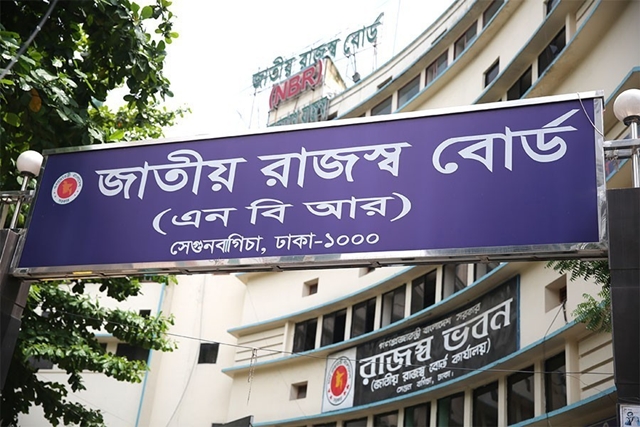SAM
Published:2019-12-10 01:28:05 BdST
Revenue growth lowest in 20 years
FT ONLINE
Revenue collection by the National Board of Revenue has faced a major shortfall of Tk20,000 crore in the July-October period of the current fiscal year, leading to the lowest growth in the last 20 years.
The revenue board could collect Tk65,096 crore against the target of Tk85,317 crore set for the period.
The revenue authority also registered a poor growth of 4.33 percent in revenue collection year-on-year. The previous record was 5.32 percent in the fiscal year 2014-2015.
The average growth in revenue collection was 10 percent in the last 20 years, according to the board's data.
A fall in export and import mainly contributed to the dismal collection of revenue, Chairman Mosharrof Hossain Bhuiyan told reporters while addressing a press conference at his office on Sunday.
Nevertheless, the revenue board chief said revenue collection will perk up by the end of this year.
As the overall export-import declined at the beginning of the current year, the National Board of Revenue fell Tk7,800 crore short of its target of Tk28,449 crore from customs. It saw less than 1 percent of the growth in this sector, said Mosharrof Hossain.
During the July-October period, the collection from customs faced a deficit of Tk7,799 crore, and the growth was 0.09 percent.
Export earnings in the first four months of the current fiscal year dropped by 6.82 percent year-on-year to $12.72 billion due to poor shipment of apparel items, according to the Export Promotion Bureau.
The Value Added Tax (VAT) was the second-lowest contributor to the revenue collection with Tk8,259 crore less than the target of Tk33,010 crore.
The NBR chairman linked the poor VAT collection to a few complexities over the enforcement of the new VAT law and a slump in local businesses.
Sales of steel, cement, leather and leather goods, agricultural tools and machinery meant for engineering works dropped after the budget for the current fiscal year had come into effect, business insiders said.
Manwar Hossain, president of Bangladesh Steel Manufacturers Association, said, "Our sales have decreased in recent times due to the imposition of Advance Tax and Direct VAT on construction material in the current fiscal year's budget."
Towfiqul Islam Khan, a senior research fellow of the Centre for Policy Dialogue, said, "The slow growth in revenue collection indicates two things – the government's incapability and poor economic condition of the country."
The government spending was also lower than its target in the first four months because of this poor revenue collection, Towfiqul said.
If this slow pace in revenue collection continues, the overall economy will be at risk, he added.
Bank borrowing to exceed the annual limit in first six months
The government's borrowing from banks is going to reach the annual target even before the end of the first six months of the current fiscal year.
As a result, the private sector might face a fund crisis in the absence of adequate loans.
The government has already borrowed 90 percent or Tk42,607 crore of its annual target –Tk47,363 crore.
In the last fiscal year, the government took Tk26,446 crore in loans from the banking sector against a target of Tk42,92 crore.
Strict rules on buying government savings certificates have driven away savers, which ultimately increased the government's bank borrowing.
In the first four months of the current fiscal year, net sales of savings instruments were Tk5,522 crore while it was Tk17,828 crore during the same time last fiscal year, according to the Department of National Savings data.
The government is planning to borrow an additional Tk4,555 crore in December as it had a deficit of Tk6,000 crore in its exchequer as of November, sources said.
Unauthorized use or reproduction of The Finance Today content for commercial purposes is strictly prohibited.


